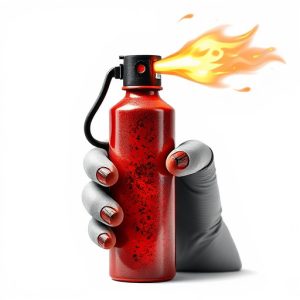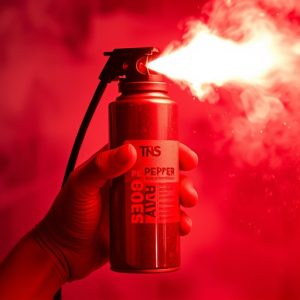Decoding Pepper Spray’s Flammability: Safety and Legal Implications
Pepper spray, which contains oleoresin capsicum and is used for self-defense, is not inherently fla…….
Pepper spray, which contains oleoresin capsicum and is used for self-defense, is not inherently flammable but can support combustion when exposed to heat sources or open flames due to its aerosol propellants like butane or propane. It's important to understand that while the active ingredient itself is non-flammable, the volatile compounds used as propellants can ignite if subjected to ignition sources during use. Users must exercise caution and be aware of the fire risk associated with these sprays, especially in environments where heat or open flames are present. Adhering to local laws and receiving proper training on the safe and legal use of pepper spray is crucial for effective self-defense while avoiding accidental fires. Knowledge of the product's chemistry and potential flammability is essential for ensuring safety and compliance with regulations governing the use of this self-defense tool.
Pepper spray, a common self-defense tool, is widely recognized for its debilitating effects on attackers. Yet, questions persist regarding its chemical composition and potential flammability—a critical safety aspect often overlooked. This article dissects the chemistry behind pepper sprays to clarify if they are indeed flammable and the implications this has for users. We delve into the science that governs their combustibility and provide essential safety precautions and legal considerations for those utilizing inflammable self-defense sprays. Understanding the nature of these chemicals is paramount for safe handling and compliance with regulations. Is pepper spray flammable? The answer lies within its molecular makeup and the environmental conditions under which it is used.
Understanding Pepper Spray and Its Flammability: A Chemical Analysis
Pepper spray, a widely recognized non-lethal self-defense tool, contains oleoresin capsicum (OC), an irritant derived from various capsicum species. The primary function of pepper spray is to temporarily disable an attacker by causing intense eye, skin, and respiratory irritation upon contact. However, the composition and formulation of pepper sprays can vary, influencing their physical properties, including flammability.
When examining the chemical makeup of pepper spray, it’s crucial to understand that while the liquid itself is not inherently flammable, it can ignite under certain conditions. The presence of an aerosol propellant, which is typically used to deliver the spray effectively, can contribute to its flammability. The propellants, often hydrocarbons like butane or propane, can be combustible. In scenarios where pepper spray comes into contact with an open flame or a heat source, the combination of the irritant and the propellant can result in a fire. It’s important for users to recognize that under these specific circumstances, there is a risk of the spray igniting, which could lead to unintended consequences. Safety protocols and training should include awareness of this flammability aspect to ensure proper handling and use, avoiding any situations where an accidental fire could occur. Understanding the chemistry behind pepper spray and its potential to burn when combined with certain substances or under high temperatures is essential for user safety and effective deployment in self-defense situations.
The Science Behind Pepper Spray and Its Combustibility
Safety Precautions and Legal Considerations for Using Inflammable Self-Defense Sprays
When utilizing inflammable self-defense sprays, such as those commonly referred to as pepper spray, safety and legality are paramount considerations. It is crucial to recognize that while pepper spray itself is not flammable, the presence of an ignition source near the spray during use can pose a significant fire hazard, as the propellants used can be combustible. Therefore, users must exercise caution to avoid any potential for fires or explosions, ensuring they keep a safe distance from open flames or heat sources when deploying the spray.
Legal implications also surround the use of inflammable self-defense sprays. Laws governing the possession and use of pepper spray vary by jurisdiction, and users must adhere to local regulations strictly. These laws often dictate not only who can legally possess such a spray but also where and under what circumstances it may be used. Additionally, understanding the legal ramifications of using pepper spray is essential, as misuse can lead to criminal charges. Users should familiarize themselves with the specific statutes in their area and carry the spray only as allowed by law. Safety precautions must be paired with knowledge of the legal framework to ensure responsible use of inflammable self-defense sprays. It is also advisable to undergo proper training to understand the effects of the spray, its limitations, and the appropriate circumstances for use.

